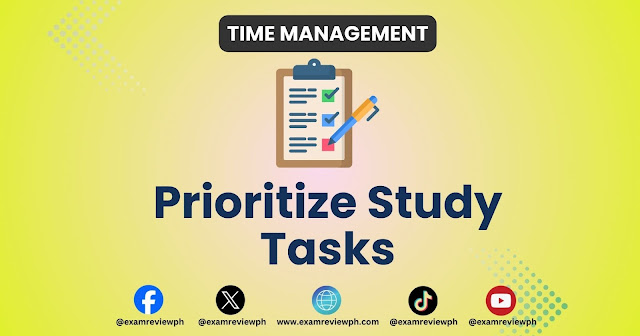Prioritizing study tasks based on urgency and importance is a crucial skill, especially when preparing for exams. Effective prioritization ensures that you allocate your time and effort efficiently, focusing on tasks that will have the greatest impact on your exam performance. By identifying key concepts, topics, or areas where improvement is needed, you can streamline your study plan and allocate more resources to areas of greater significance. This approach helps optimize your study time, enhance comprehension, and increase retention of essential information, ultimately leading to better exam outcomes.
Here's a detailed guide on how to prioritize study tasks for exam preparation:
Understanding Urgency and Importance:
Urgency: This refers to the time sensitivity of a task. Urgent tasks require immediate attention to prevent negative consequences like missing deadlines or incomplete preparation.
Importance: Importance relates to the value or impact of a task on your overall exam readiness and performance.
Steps to Prioritize Study Tasks:
1. Make a Comprehensive Task List:
- Start by listing down all the study tasks you need to complete before your exam. This can include topics to revise, practice questions to solve, assignments to finish, or notes to organize.
2. Evaluate Each Task:
- For each task, assess its urgency and importance.
- Urgency Evaluation: Determine when each task needs to be completed relative to your exam date. Tasks due sooner are more urgent.
- Importance Evaluation: Consider how much completing each task will contribute to your understanding of key concepts or your ability to answer exam questions effectively.
3. Apply the Eisenhower Matrix:
- Use a prioritization framework like the Eisenhower Matrix to categorize tasks:
Quadrant 1 (Urgent & Important):
- These are top priority tasks demanding immediate attention.
- Example: Reviewing key concepts for sections you find challenging.
Quadrant 2 (Not Urgent but Important):
- Schedule these tasks to ensure they are completed before the exam.
- Example: Creating a study schedule, practicing past exam papers.
Quadrant 3 (Urgent but Not Important):
- Consider delegating or minimizing these tasks to focus on higher-priority items.
- Example: Responding to non-critical emails or minor administrative tasks.
Quadrant 4 (Not Urgent & Not Important):
- Avoid spending significant time on tasks in this quadrant.
- Example: Non-essential activities that do not contribute to exam readiness.
4. Prioritize Based on Deadlines:
- Address tasks based on their deadlines, ensuring urgent tasks are tackled promptly while scheduling time for important but less urgent tasks.
5. Allocate Study Time Accordingly:
- Dedicate more study time to tasks categorized as urgent and important.
- Maintain a balanced approach by scheduling regular study sessions for important but less urgent tasks.
6. Monitor and Adjust:
- Regularly review your task list and priorities.
- Adjust your schedule based on progress, changing deadlines, or evolving study needs.
Additional Tips for Effective Prioritization:
- Break Down Larger Tasks: Divide complex topics or assignments into smaller, manageable tasks for easier prioritization and progress tracking.
- Use Tools and Techniques: Utilize study planners, apps, or techniques like Pomodoro to enhance productivity and time management.
- Stay Flexible: Remain adaptable to unexpected changes or new priorities that may arise during your exam preparation.
By prioritizing study tasks based on urgency and importance using these strategies, you can optimize your study time, enhance comprehension of key concepts, and maximize your exam performance. Remember, effective prioritization is a key study technique that can significantly impact your success in exams.

